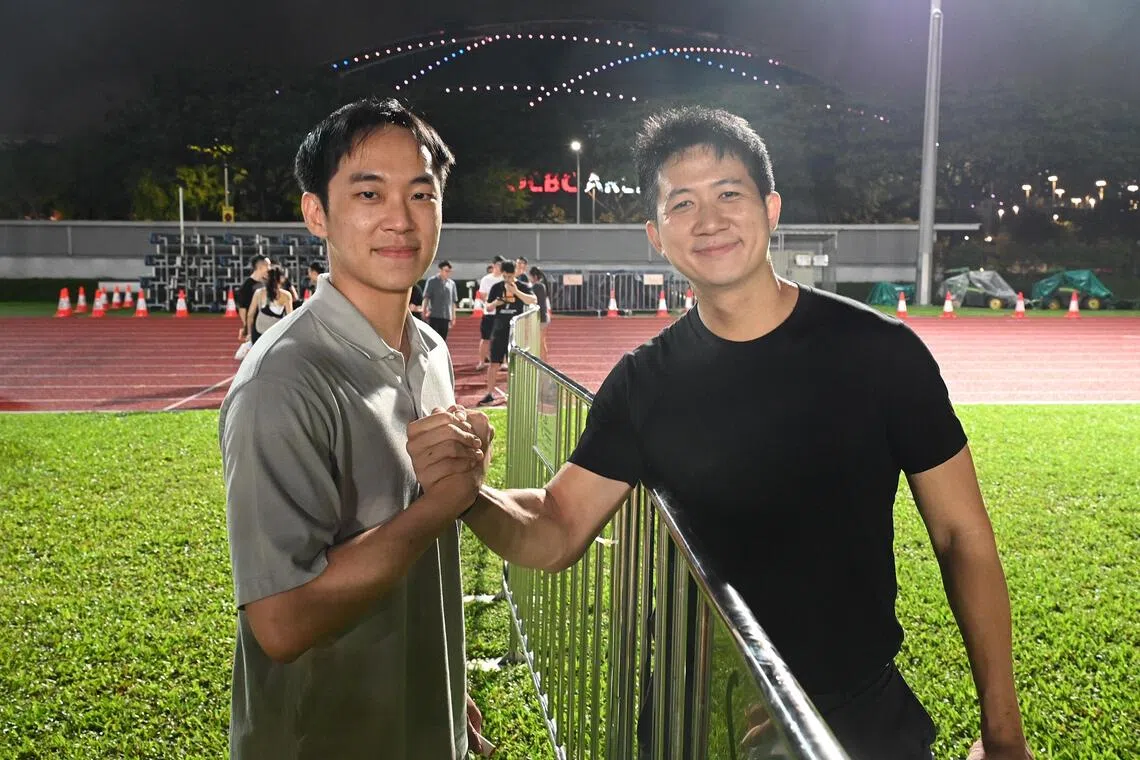Independent candidates in GE2025 among those who have applied to be NMPs
Sign up now: Get ST's newsletters delivered to your inbox

GE2025 independent candidates Darryl Lo (left) and Jeremy Tan have submitted applications to be considered for the Nominated Members of Parliament scheme.
PHOTO: ST FILE
Follow topic:
- Two GE2025 independent candidates, Darryl Lo and Jeremy Tan, have applied to be Nominated Members of Parliament (NMPs).
- Lo aims to represent younger Singaporeans' views on job security and cost of living, while Tan seeks more diverse political representation through the NMP scheme.
- The Special Select Committee will interview candidates; NMPs should contribute actively and offer broad perspectives.
AI generated
SINGAPORE – The two independents who ran in May’s General Election have thrown their hats in the ring for consideration as Nominated MPs (NMPs).
Nominations for this round of NMP appointments closed at 4.30pm on Nov 6. An eight-member Special Select Committee (SSC) chaired by Speaker of Parliament Seah Kian Peng will then interview and consider the eligible candidates.
Unlike past rounds, no one from the green or arts community has made his or her application public. The total number of those who have put their names forward for consideration is typically disclosed by the Office of the Clerk of Parliament within days.
The two political newcomers – Mr Darryl Lo, 28, and Mr Jeremy Tan, 35 – told The Straits Times that they have different reasons for wanting to become NMPs.
At GE2025, Mr Lo ran in Radin Mas SMC, where he garnered 23.52 per cent of the votes. Mr Tan, who ran in Mountbatten SMC, received 36.18 per cent of the votes there – the highest vote share for an independent candidate since the 1972 General Election.
Mr Lo, who submitted his application on Oct 29, said he hopes to represent the views of younger Singaporeans.
“As Singapore enters the 15th Parliament, issues such as job security, cost of living and housing will be central to public debate,” said Mr Lo, who states on LinkedIn that he is currently on a career break.
“Younger Singaporeans, in particular, will be the ones who live with the long-term impacts of these policies. It is therefore crucial that their perspectives are represented.”
Mr Tan submitted his application on Nov 5. He said he did so partly to encourage other independent-minded Singaporeans to contribute to the country.
“Many Singaporeans are distinguished in their own right, and I hope that my application would encourage others to do so as well,” said the self-described retiree, who dabbles in consulting, entrepreneurship and investments.
Mr Tan said that with only the ruling PAP and opposition Workers’ Party represented in the 15th Parliament, he would like for Singapore to have more diverse political representation through the NMP scheme. The Progress Singapore Party had two Non-Constituency MPs in the previous term of Parliament.
Mr Lo said that if selected, he intends to speak up on day-to-day concerns affecting Singaporeans, promote more accessible policymaking processes, and advocate for youth participation in politics.
The NMP scheme was started in 1990 to ensure a wide representation of views in Parliament. There can be up to nine NMPs during each term, which lasts 2½ years.
Nominees should have performed distinguished public service, brought honour to Singapore or distinguished themselves in their respective fields – namely arts and letters, sports, culture, the sciences, business, industry, the professions, social or community service or the labour movement.
NMPs should also take an active part in Parliament proceedings, among other requirements.
When nominations were called in 2020, there were 61 submissions
Besides submissions from the public, seven functional groups – business and industry, the labour movement, the professions, social service organisations, the civic and people sector, tertiary education institutions, and media, arts and sports organisations – are also invited to submit names of suitable candidates.
Parliament said that the SSC has refrained from disclosing the full list of candidates during previous NMP appointments as disclosure may deter potentially suitable individuals from putting their names forward for future appointments.
But this does not restrict a candidate from choosing to publicise his or her nomination to be considered as an NMP, and some have done so in the past, it noted.
Apart from interviewing the nominees, the SSC will also seek elected MPs’ views on the individuals proposed. The committee will then discuss and decide whom to nominate before submitting a list of candidates to the president for appointment as NMPs.

